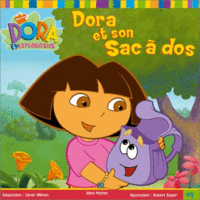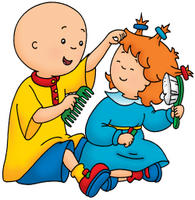 I have a young student who is turning two in a few months. You may be thinking, "A two-year-old student??" But basically, I've been hired to maintain the language recognition skills she has developed from having lived with a French au pair for approximately six months. It's as if I babysit her, just in French.
I have a young student who is turning two in a few months. You may be thinking, "A two-year-old student??" But basically, I've been hired to maintain the language recognition skills she has developed from having lived with a French au pair for approximately six months. It's as if I babysit her, just in French.We watch some French-language DVDs together, which has been an interesting experience. I had never even watched Dora the Explorer in English, let alone in French--and I was surprised to find out that Dora teaches English as the foreign language in the French DVD, not Spanish. Kinda negates the whole purpose of having Dora the Hispanic Explorer in the first place: one episode features the fifteenth birthday party of Dora's cousin. This poses a huge cultural gap for the French DVD, as there is no such thing as quinceañera in Francophone culture. Losing the Spanish language connection left me and my student high and dry as viewers. It made me ponder the reasoning behind changing the second language in the program to English instead of keeping it at Spanish. Perhaps the show's producers thought that there were no little Canadian kids who'd want to bypass English language learning and go straight to Spanish. Who knows?

We fared much better with some Caillou DVDs. This being a show produced by a Francophone company, there was no cultural gap to overcome. I got a very real sense of satisfaction in noting that the voices matched up perfectly with the French language, meaning that the show was always meant to be seen in French before being dubbed into English. (I will save my rantings on the issue of film dubbing in France for another post.)
On the DVDs, there is a portion between each episode that features Caillou's teddy bear (Nounours), his cat, Gilbert, and his stuffed turtle as live-action puppets. I have found that my little student HATES puppets (hates puppets, loves Muppets--she's quite a discriminating consumer) and has taken to pointing at the screen and saying "No!....No!....No!" whenever they come onto the screen. She isn't happy again until she is safe in the knowledge that I am fast-forwarding through that portion as fast as I can.
Puppet phobias aside, I enjoy watching Caillou. For those of you not in the know, Caillou means "pebble" or "small stone," fitting, considering that the character has no hair; his sister's name is Mousseline, mousse, of course, meaning "moss". I'm impressed at this play on words, as I assumed the saying "A rolling stone gathers no moss" was an Anglophone one. Ironically, this clever play on words is lost in English, with the little sister's name having been changed to Rosie. I don't understand that--why would you keep "Caillou" but change "Mousseline"? I think Caillou is much harder for Anglophones to pronounce than Mousseline is. Go figure.




1 comment:
I was first exposed to Dora in France while babysitting (for a child who will grow up to be tri-lingual - english, french and swedish) and had never even been aware of Dora's hispanic background. Besides, I love the Sac à Dos's song.
Post a Comment